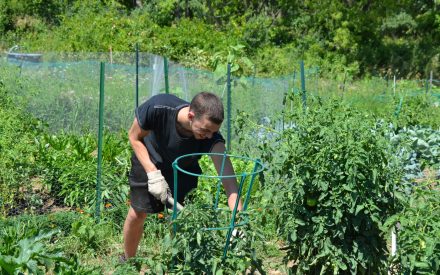Food insecurity contributes to poor mental and physical health, cognitive and behavioral challenges in school, and more difficult family functioning. The pandemic was particularly devastating to food security because it disrupted the four foundations of food security: economic security, access to strong federal nutrition programs, a robust emergency food network, and a vibrant food system. The number of adults reporting that they sometimes/often don’t have enough to eat more than doubled, from around 3.5 percent in the years preceding the pandemic to 7.5 percent during the pandemic. The share of adults with children who reported their children sometimes or often didn’t get enough to eat increased from around 4% to 13% during the first months of the pandemic. These were unprecedented increases, far surpassing the maximum rates during the Great Recession of the late 2000s. Disparities across race and ethnicity persisted in the pandemic period, with 40% of Black adults who live with children reporting that their child did not always get enough to eat in the past week.
Food banks, local officials, entrepreneurs, and volunteers came together to address food security. To address the issue adequately, they required a shared, evidence-driven understanding of the problem’s extent and the underlying causes. In response, Extension compiled extensive state and local data related to food security and its underlying foundations and collaborated with partners to learn about using the emergency food system during the pandemic. For example, in collaboration with UW-Madison researchers, Extension maintained a data and mapping interface with extensive state and local data related to food security. This online resource collected 2,315 pageviews prior to March 2021. Based on our evidence-driven work, we developed and widely shared a theoretical framework of food security designed to support organizations in addressing food security as a systemic issue (“Table Legs Framework”). Partners at the state and local level are increasingly using the framework for food security.
In addition to these system-focused efforts, local Extension educators have increased the availability of timely information to help households access food resources during the pandemic. The pandemic has created disruptions in food access stemming from lost income, loss of school meals, and service disruptions at food pantries. Additionally, safety and health concerns around retail food access was exacerbated.
Food security information was shared locally via media and newsletters in 46 counties. These and related efforts capitalized on UW-Madison Extension’s unique positioning at the interface of research-based knowledge, insight into community needs and capabilities, and strong local partnerships. Collectively, programming in this area helped increase stakeholders’ understanding of food insecurity, communities’ ability to provide a vital food security infrastructure, and families’ ability to access the food they need.
Download Article

 Connecting Farmers, Gardeners and Food Pantries to make Healthy Produce Accessible to all Wisconsin Residents
Connecting Farmers, Gardeners and Food Pantries to make Healthy Produce Accessible to all Wisconsin Residents Supporting Safe & Sustainable Gardening
Supporting Safe & Sustainable Gardening Supporting Food Entrepreneurs of Color
Supporting Food Entrepreneurs of Color Supporting Small Businesses & Entrepreneurs
Supporting Small Businesses & Entrepreneurs


